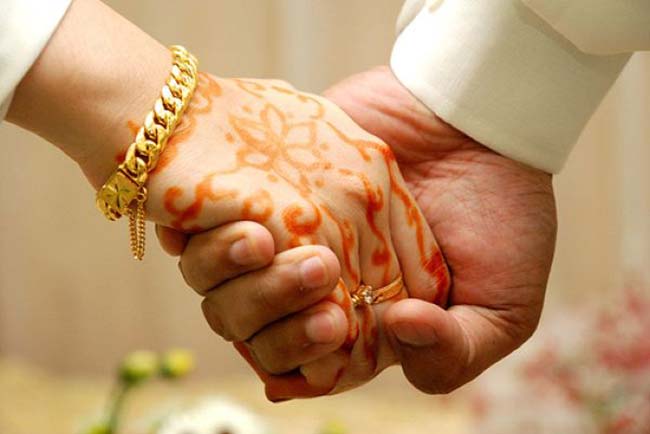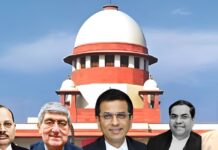The courts in Jammu and Kashmir settled many cases in 2012. While the verdicts evoked controversies in many instances, some cases got heightened media coverage; some disappointed the larger society while others were downplayed, Syed Asma reports.
“It is their [hardliners] politics of status quo which benefits only them and no one other. If they have a solution, let them come forward and give us.”
Miwaiz Umar Farooq, Chairman All Parties Hurriyat Conference (M) said before leaving on his 10 days long Pakistan Yatra. He along with other seven members stayed in New Delhi for three days before leaving to Pakistan.
DELUXE YATRA
The Supreme Court of India taking suo moto cognizance of 0.00015 percent pilgrim deaths during Amarnath yatra this year heard the case for five months and came out with a verdict redefining the yatra. The verdict was formulated after hearing representatives from central and state government and Shri Amarnathji Shrine Board (SASB). It is largely based on the recommendations framed by the SC’s Special High Power Committee (SHPC).
Without considering the carrying capacity of the place, the SC has given full authority to SASB to invite as many people as they want to perform yatra and mentioned, in a line, that the environment should not be disturbed! Apart from ordering construction of pre-fabricated structures and STPs, putting up railing along the path, widening the track, making doctors available at every 2 km, the SC has directed the state to use cement tiles on the path leading to the cave.
But the cement tiles in sub zero temperature can be more slippery and can lead to more serious fracture if a yatri slips. It may even add to the death toll in the days of yatra. Besides, increasing role of SASB in yatra was not encouraged by Kashmiris. They see a small East India Company in it.
IMPUNITY, A SUPERPOWER
The SC judgement on Pathribal fake encounter gave the armed forces a choice of taking their case away from the civil/criminal court. The SC could have set a precedent by taking the five accused army personnel to task and ordering a civil trial in the case. Instead, it gave Army an option to either go for the General Court Martial (GCM) of the accused or face trial in the civil court. The army choose an obvious option of court martial and took the case away from the public domain. Presently, the GCM proceedings are taking place in Jammu.
The judgement is likely to affect every case of human rights violations involving government forces. At least five similar cases are pending in the courts that will get affected; one is Machil and other is from Ganderbal.
It has been six months and Central Bureau of Investigation(CBI), National Central Bureau(NCB), Interpol is yet to send an official confirmation of Major Avtar Singh’s death to the police in Kashmir. Major Singh killed himself and his family in June this year. The Srinagar court has asked the IGP to get a copy of the original information submitted by Selmo Cornos office, California to US NCB Interpol Washington with regard to the death of Major Singh so that they can proceed with the case.
Major was living as a businessman in California after he left India when a court charged him for murdering Jaleel Andrabi, a lawyer and human rights defender, in 1996. Major is accused of many murders and many FIRs are filed against him in different police stations but no action has been taken so far. He didn’t attend even a single trial in the Andrabi’s case.
It was widely believed that Avtar managed to flee to Canada and then to US with the support of union government and Indian Army.
IMPRISONED TILL DEATH
In a significant judgement, the state High Court (HC) while rejecting the petition for the release of Ashiq Hussain Faktoo, came up with a new interpretation of the state law for life imprisonment which makes it imprisonment till death of a convict.
The SC, after a few days in a separate case, also came up with a same interpretation. This is likely to affect at least 25 Kashmiris who are facing life imprisonment in different jails. Faktoo, a pro-freedom leader, completed 20 years of his life in jail in May this year. He was held guilty of killing N Wanchoo, a human right defender, in 1990. Faktoo family and lawyer have filed a writ petition against the HC’s verdict.
INCARCERATING INNOCENTS
The Delhi HC slammed Delhi Police for serious lapse in investigation of 1996 Lajpat Nagar bomb blast and acquitted two youth who were sentenced with capital punishment in the case. It took the court of law 17 years to realize that its police have little evidence against the two youth who lost prime years of their life in jail. The blast had claimed 13 lives and had injured 39 people.
A SCANDAL NO MORE
Congressman, Ghulam Ahmad Mir, Raman Mattoo, a state minister, Iqbal Khanday, a top bureaucrat, Sabeena and her husband, Abdul Hamid, were exonerated by a special CBI court in Chandigarh. Sabeena was accused of running a sex racket across Kashmir serving high profile gentlemen of the state.
Giving them a benefit of doubt, the court exonerated the accused from the case stating that the victims had turned hostile during cross-examination. The case wasn’t dealt with in an ordinary way. It had almost 100 witnesses and the entire charge-sheet was in a coded form. The accused had to approach Punjab and Haryana HC to get it decoded. The racket had exposed a gang of elites who were misusing their positions to exploit the women of their society including a minor.
A CONTROVERSIAL JUDGEMENT
Justice Hasnain Masoodi came up with the most controversial judgement of the year on the institution of marriage. He was criticized for quoting and misinterpreting Quran and Hadith and for making the conditions which are recommendatory in Quran, obligatory in this judgement. The judgement had induced debates among lawyers and religious leaders. Conferences were held and writ petitions were filed to get the mistakes rectified but nothing substantial has come up yet.
The judgement was passed in a case wherein a wife had asked for her maintenance allowance from her husband after getting divorced. The lower court had rejected her plea. The HC, quashing the earlier court order, raised and answered an irrelevant question about absolute and unqualified power to pronounce divorce on his wife and wriggle out of his obligations under the marriage contract.
Justice Masoodi was criticized for not consulting local Islamic scholars and leaders or the domestic and international Islamic schools or universities for help instead of interpreting the Holy Book on his own.
NO CONCESSION
The state HC this July dismissed a petition of Muhammed Amin Beigh, 40, who was evading arrest under PSA for his alleged involvement in exploiting girls, both monetarily and physically. Beigh, a resident of Kulgam, was running a private security agency ‘Swello Security Agency’ and had established an office at Raj Bagh and Islamabad.
“The acts have potential of disturbing the public order and public peace. The girls coming from humble background would be afraid to do the jobs, which, otherwise, they crave for, and thus, normal life of society at large will be disrupted,” his Justice Attar said.

















